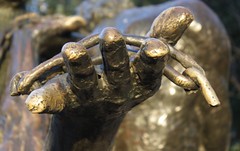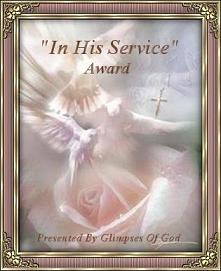What is repentance, really?
Is it trying really, really hard to feel bad about something you did, in order to win God’s forgiveness?
Is God up in Heaven with a Misery Meter, waiting for you to push the level up to a certain notch of guilty torment before He’ll forgive you?
Is repentance the price you have to pay so you can keep sinning? Is it sort of like the hangover after a night of drinking…you know it’s going to hurt afterwards, but the sin is worth it?
If you can work up a good enough repentance, does that make the sinning okay?
What do you have to repent of, anyway…the sin, or the enjoying of it, or both?
How do you know when you’ve repented enough, felt sorry enough, or done enough good deeds to make up for your sin?
What about those who walk for days on their knees, or hit themselves with heavy chains and whips, or cut themselves because of their sins? Are they repenting?
Or does repenting mean promising God that you’ll never do that particular sin again; that you’ll straighten up your act from now on?
What is repentance?
It isn’t really possible to understand repentance without first understanding what sin is. (That link will take you to all of the entries labeled “sin” in this blog. They’re in reverse order, so you might want to scroll all the way to the bottom and read “up” to get them in order.) God’s word lists many sins, but there is really only one Sin underlying them all.
Sin is turning away from God. It is trusting/loving something or someone more than God. It is believing that life, joy, peace, or any other good thing is better found outside of God than in Him. It is dethroning Him and putting something or someone else in His place in your heart.
If that’s what sin is, then can any of our above examples truly represent repentance?
We hurt ourselves to get forgiveness. We try to work up sorrowful emotions to placate God. We play Him for a fool, tossing Him a few tokens of sorrow to pay Him off, so we can keep indulging in the sins we love. We seek to earn. We try to impress. We do our best to get ourselves off of the hook. We make promises. We, we, we. It’s all about us.
That’s not repentance. It’s penance.
What’s the difference?
Penance focuses on sin and on self.
Repentance focuses on God.
If sin is turning away from God and looking to self or others for what we need, then guess what…
Penance, which looks to self to earn forgiveness, is sin!
And if sin is turning away from God and looking to self or others for what we need, then what is repentance?
Repentance is realizing how foolish we were to think we could find life, joy, peace, etc in anything outside of God. And it’s turning back to God because we’ve come to our senses and realized again that He is all we need. It is making a you-turn from worshiping sin and self to worshiping God. From trusting sin and self to trusting God. From insulting God to treasuring Him. It is a change of focus, and a reorienting of faith.
Repentance wants Christ.
Penance just wants to find a way to continue in sin, and to avoid eternal consequences by assigning itself temporary ones.
Repentance worships Christ, loves Him, treasures Him.
Penance worships, loves, and treasures sin, and will pay any price to be allowed to indulge in it.
Just look at Mardi Gras. It’s nothing but a huge celebration of sin that negates any attempts at piety or penance that may surround it.
We celebrate what we love. And Mardi Gras is just one vivid reminder that unrepentant sinners love sin.
To love sin is to hate Christ (Pr. 14:2, Matt. 12:30), no matter what religious activities you may indulge in to convince yourself otherwise. God isn’t fooled. There is no repentance without turning from sin to Christ.
But always remember, the Christian life is a journey of growth. There is a sense in which we repent “once for all,” when we are first awakened to see Christ and desire Him as our Savior and Lord. That is repentance unto salvation, and it’s a precious thing.
But we don’t ever stop repenting...not for salvation, but for our continued walk with the Lord. It makes sense, after all. We do slip into sin, and whenever that happens, we’ve temporarily valued something above Christ. Repentance gets our values straight again.
And we continue to need repentance for another reason, too, not just because we still sin sometimes. We continue to need repentance because we continue to grow. As we grow, we recognize more of Christ’s worth, and we recognize more of our own foolishness. We find ourselves repenting of sin that we never repented of before because we didn’t recognize it before. Those who are not growing in repentance are not growing at all.
Does this sound like a drag? A life of continual sorrow and misery?
It’s anything but that!
Repentance is turning toward joy! It is recognizing that we’ve been seeking life and joy in the wrong places, and it’s turning to find them in God again. It is pulling our noses out of the sewers and putting them back in the bakery where the Bread of Life offers Himself freely (Isa. 55:2).
Remember how King David of old prayed when he repented of his sin with Bathsheba?
Make me hear joy and gladness, that the bones You have broken may rejoice (Ps. 51:8)
Restore to me the joy of Your salvation (Ps. 51:12)
True repentance cries out with David, “Forgive me for seeking life and joy elsewhere, and let me find them in You again!”
And Christ, who is our life (Col. 3:4) and our joy (John 15:11) is delighted to answer that prayer. He is glad to give us Himself.
After all, He went all the way to Calvary to do just that.
--------------
This devotional owes a great deal of its thought to Pastor John Piper, my spiritual father whom I’ve never met. If you want to know more about God-centered living, please check out his huge store of free, downloadable audio sermons and other resources at Desiring God Ministries.
Some of the inspiration for this devotional also came from Beth Moore’s Bible Study, “When Godly People Do Ungodly Things.”


![Reblog this post [with Zemanta]](http://img.zemanta.com/reblog_a.png?x-id=c32d7c61-608d-4cb0-913a-b01f647ddb0f)


![Reblog this post [with Zemanta]](http://img.zemanta.com/reblog_a.png?x-id=5965d7c2-f177-4a16-bcee-d0fdd1a40037)


![Reblog this post [with Zemanta]](http://img.zemanta.com/reblog_a.png?x-id=17a90a3b-bd34-448b-b170-653d656ababd)

![Reblog this post [with Zemanta]](http://img.zemanta.com/reblog_a.png?x-id=ba16b6f2-84ce-4faf-8107-c030cbc4fb3f)

![Reblog this post [with Zemanta]](http://img.zemanta.com/reblog_a.png?x-id=e4f8c67a-edf0-45b6-b4cf-bdb47198a26c)















